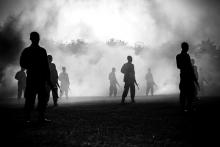Departments

Yes, his blood was on us once,
making us famous blades within the blades
community. I mean, many of us
had taken blood and sweat before
from lions and dogs and even fallen birds
or lovers and killers and the killed
but this was the first time we took both
at the same time, from the same creature.
You humans have that saying,
Blood, sweat, and tears. By this you signify work.
Consider the lilies of the field, he said
of our cousins. They neither work nor spin
but I tell you that not even Solomon
in all his glory was clothed like them.

INVITATIONS COME. Yet an expressed desire for your presence does not guarantee your willingness to show up. Invitations require a response. Some responses indicate significant commitment beyond “just showing up.” A summons may first entail an RSVP indicating a commitment to actually take an active part in the opportunity.
Such is the case for the people of God. Invitations arrived inviting God’s people to be witnesses to the power and presence of a particular God and to become a people who practice justice and favor kindness—peculiar expectations for an ancient culture, for any culture. A requirement of this sort unsettles the status quo of cultural mores where religion represents polytheistic attributions to a type of celestial Santa Claus or divine ATM, or where religion has been privatized—set aside from public prophetic witness to meditative reflection in the privacy of our own homes with occasional festive gatherings. Such genie-worship and privatization results in a deafening silence among the people of God. As Pope Francis put it recently, “a privatized lifestyle can lead Christians to take refuge in some false forms of spirituality.”
The promises that God calls us to are promises that Michael Frost, in Exiles, calls dangerous. They accompany dangerous memories that make a dangerous critique of society.
Over the next five weeks, the invitations extended in these texts indicate more than increasing the head count of seekers of spirituality. They require a response that signifies a commitment to participating in a community whose primary purpose is to expose the dangerous promise of God.

Chiamaka tells of women who plant seeds
of peace in tribal towns, pot-banging with spoons
to call men off their game of raid-and-rape.
A girl named Hope intercepts the hands
of crowing children trading blows
and coaxes them to shake their hands
although her own are quaking. At school
my shy daughter stuffs notes in friends’ lockers,
imploring playground harmony.

EXECUTE: TO ENACT OR DO. Having grown up in inner-city Chicago, I have fond memories of red fire hydrants, swinging jump ropes, and church robes. During summer, the fire department would open the hydrants. Parents granted the petitions of children to run through the streams of water, soaking our clothes and cooling our backs. And while I never achieved the rhythmic agility to jump Double Dutch, I loved to recite the rhymes, which eventually helped me gain a verbal dexterity like that of my pastor. I wanted one day to have a robe like hers—one that signaled that the words I spoke revealed the reign of God.
Turn the clock back. Some children would hold very different memories of fire hydrants, ropes, and robes. In Birmingham, Ala., in1963, the force of the water injured petitioners for freedom. During the American Revolution, a Virginia justice of the peace named Charles Lynch ordered extralegal punishment for Loyalists to the Crown. The swinging rope became the tool of mob violence. And the “hooded ones” continue to use the label of “Christian” to make a mockery of the vestments of clergy.
Fire hydrants. Ropes. Robes. Execute: to eliminate or kill. Meaning conveyed to the hearer may not at all resemble the intention of the speaker. Often communication requires suspension of what we think in order to listen to the context from which the speaker shares. Reading is no easier a task. Sometimes the same letters forming the same word present entirely different meanings. Justice executed. What does it mean?
The context for the next four weeks exposes what the Lord’s justice requires.

“Belief is as hard as a hickory nut
that cracked holds many mansions.”
—Pat Schneider
If my belief were a hickory nut
I’d keep it safe in my pocket
easy to find with fumbling fingers.
When challenged
I’d take it out
say here, see this.
This is what I believe.

Bio: Sister Jean Lait, CSF, is an Anglican Franciscan sister based in San Francisco who protests drones and their effects on children. communitystfrancis.org
1. Why did you decide to stand up against drones?
During WWII, I experienced the bombing of Coventry in England. As a child of 9 years, I slept under the stairs, anxiously waiting for the bombs to drop. Toward the end of the war, flying bombs known as “doodlebugs” were used. These were very similar to drones and were sent from Germany. They were aimed anywhere. These were bombs where you heard a whistle and then it was silent before the bang.
Thinking back on the fear and anxiety I experienced, the whole idea of drone warfare is just immoral to me. No child should ever be that frightened. No child should have to live in a war zone. That kind of trauma affects you, one way or another. You either use that experience for good or otherwise.

Night.
The sheep huddled against this big rock.
Jake keeps watch while I wrestle with sleep:
—wool prices down, third year
—owner talks of selling out
—Jake and me—Where do we go?
—Martha’s carrying our fifth child
—rumors that Herod’s at it again,
—this time killing babies.
—Same old story:
the Empire trades in fear.
Where can we run?
Like papa says, “I hate being poor.”